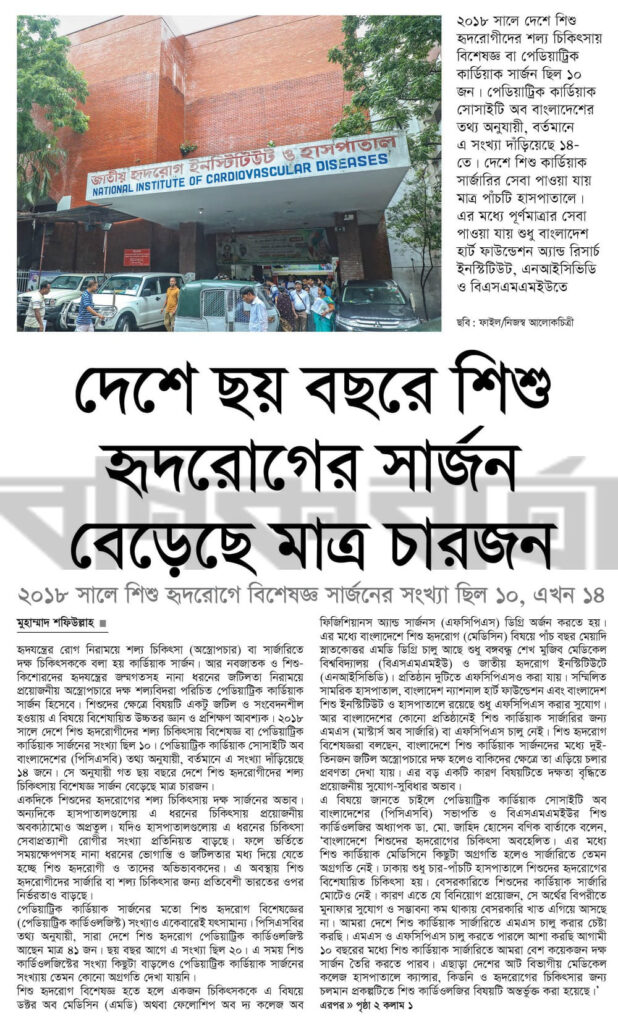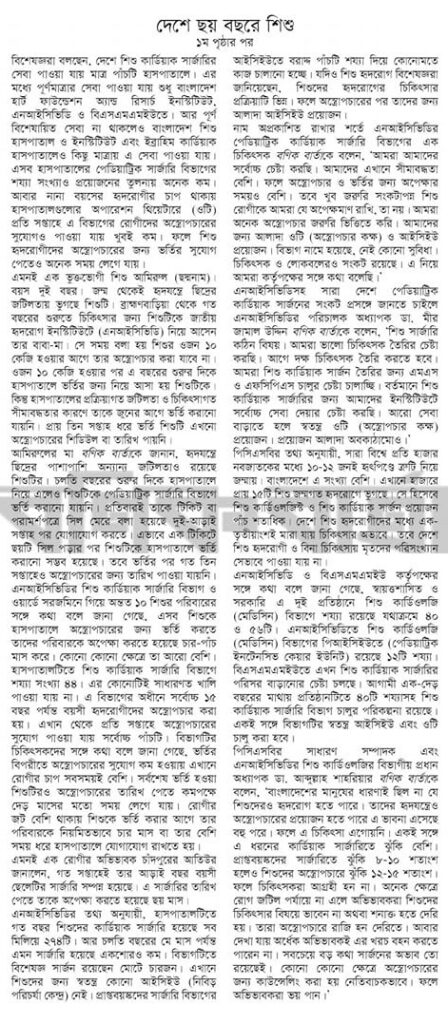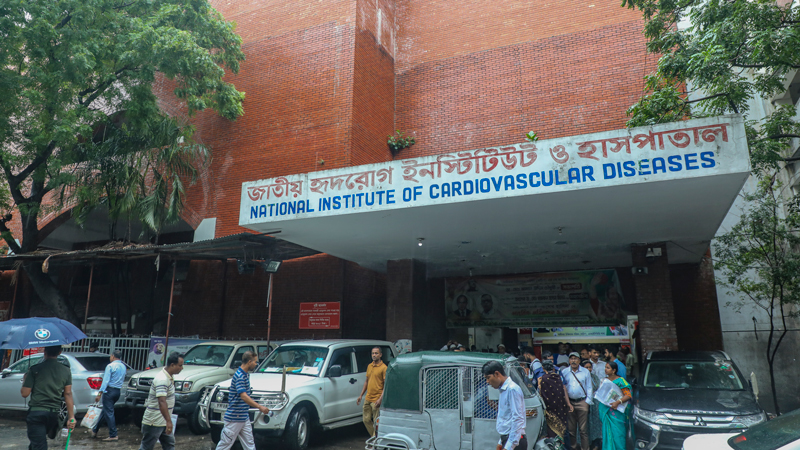(The data of the Pediatric Cardiac Society of Bangladesh (PCSB) said that as of 2018, the country had only 10 specialists in pediatric cardiac surgery. Over the past six years, the number increased to 14, which means the country currently has 14 specialists in this particular medical sector.)
In treating congenital and complex heart diseases requiring surgical intervention (cardiac surgery), skilled surgeons specializing in pediatric cardiac surgery are known as pediatric cardiac surgeons. This term specifically refers to doctors proficient in surgical procedures (surgery) for congenital heart defects and other complexities in newborns and adolescents. Due to the intricacies and sensitivity involved, specialized knowledge and training are essential in this field. As of 2018, Bangladesh had only 10 specialists in pediatric cardiac surgery. Over the past six years, the country has seen an increase of only four specialists in pediatric cardiac surgery.
On one hand, there is a shortage of skilled surgeons in pediatric cardiac surgery, besides, hospitals lack the necessary infrastructure for such treatments, despite an increasing number of patients seeking these specialized services. This situation necessitates navigating various complexities and challenges for pediatric cardiac patients and their caregivers. Consequently, dependency on neighboring India for pediatric cardiac surgical expertise is growing.
The number of specialists in pediatric cardiology, like pediatric cardiac surgeons, remains insufficient. The Pediatric Cardiac Society of Bangladesh (PCSB) said there are only 41 pediatric cardiologists across the country. This number has increased from 20 six years ago, but there has been little progress in the number of pediatric cardiac surgeons during this time.

To become a specialist in pediatric cardiac diseases (pediatric cardiology), a doctor needs to obtain a Doctor of Medicine (MD) or Fellowship of the College of Physicians and Surgeons (FCPS) degree in this field. In Bangladesh, only Bangabandhu Sheikh Mujib Medical University (BSMMU) and the National Institute of Cardiovascular Diseases (NICVD) offer a five-year postgraduate MD degree in pediatric cardiology. Both institutions also provide FCPS opportunities. However, there is currently no provision for an MS (Master of Surgery) or FCPS in pediatric cardiac surgery in any Bangladeshi institution. Pediatric cardiac specialists emphasize that while there are a few highly skilled pediatric cardiac surgeons in Bangladesh capable of complex surgeries, others lack the expertise. This disparity underscores the urgent need for enhanced support and facilities to improve expertise in this field.
Dr. M. Zahid Hussain, President of the Pediatric Cardiac Society of Bangladesh (PCSB) and Professor of Pediatric Cardiology at BSMMU, said, “Pediatric cardiac care in Bangladesh is neglected. Although there has been some progress in pediatric cardiac medicine, there has been no such progress in surgery. Specialized treatment for pediatric cardiac patients is only available in four to five hospitals in Dhaka. Due to insufficient profitability prospects, there is no private investment in pediatric cardiac surgery.”
He added that initiating an MS (Master of Surgery) program in pediatric cardiac surgery in the country is under process. Within the next 10 years, we will have several skilled surgeons in pediatric cardiac surgery if we succeed in starting the programs.
Additionally, pediatric cardiology has been included in the ongoing projects for cancer, kidney, and heart diseases at the eight divisional medical colleges in the country, he added further.
Experts highlight that specialized pediatric cardiac surgery services are only available in five hospitals in the country. Among these, comprehensive services are primarily available at the Bangladesh Heart Foundation and Research Institute (BHFRI), NICVD, and BSMMU. While Ibrahim Cardiac Hospital and Bangladesh Shishu Hospital & Institute also provide some level of specialized care, their pediatric surgical department capacities are significantly limited compared to the demand. Moreover, due to the burden of cardiovascular diseases at various ages, opportunities for pediatric cardiac surgery in their operation theatres are very scarce on a weekly basis. As a result, securing admission for pediatric cardiac surgery patients often involves significant delays.
A child from Brahmanbaria, suffering from congenital heart disease since birth, was brought to the National Institute of Cardiovascular Diseases (NICVD) by his parents earlier this year for treatment. The child’s surgery was postponed at that time as it was weighing less than 10 kilograms. Later in the year, the child was brought to the hospital for admission, but due to administrative complexities and limitations in treatment options, admission was not possible before June. The child has been waiting for nearly three weeks now without a scheduled date for surgery.

The child’s mother said to Bonik Barta, “Several complications are affecting my child including heart disease. He was not admitted to the pediatric surgery department earlier when he was taken to the hospital. Each time, the authority told us to contact them after two or three weeks. Only after obtaining six such seals in one ticket, we were able to admit the child to the hospital. However, even after admission, a surgery date has not been scheduled in the past three weeks.”
This scenario is common in the Pediatric Cardiac Surgery Department and ward of NICVD after discussing with more than 10 families. Families have been waiting for about four or five months, and sometimes, the waiting period is even longer.
In the pediatric cardiac surgery department of NICVD, the bed occupancy is 44, typically leaving no beds vacant. This department provides cardiac surgery services for patients up to a maximum age of 15 years. Each week, a maximum of five surgeries are performed. Discussions with the department’s physicians revealed that due to the limited availability of surgery slots, patients’ pressure is consistently high. The latest admitted child waits approximately one and a half months for surgery. The patients’ families are required to stay in touch with the hospital regularly for at least four months or longer before admission for such a scenario.
According to NICVD’s information, in 2023 there were a total of 274 pediatric cardiac surgeries performed at the hospital. Until May of the current year, even fewer surgeries have been conducted. The department has four specialized surgeons. There is no separate Intensive Care Unit (ICU) available for children here. The situation is being managed with only five beds allocated in the ICU of the adult surgery department till now.
Speaking on condition of anonymity, a physician from NICVD’s Pediatric Cardiac Surgery Department said to Bonik Barta, “We are doing our best. We face limitations here. Therefore, both surgery availability and waiting times are high. However, we prioritize urgent surgeries as much as possible. We require a separate operation theatre (OT) and ICU for them. Except for the department’s name, there are no such facilities available.”
Dr Mir Jamal Uddin, Professor and Director of NIVDC said, “Pediatric surgery is tough and challenging. Initiatives like MS and FCPS programs for pediatric cardiac surgeons have taken from striving to train component doctors. Currently, we are striving to provide the highest level of service for pediatric cardiac surgery at our institute. Additional facilities like a separate ICU are necessary to expand services.”
According to PCSB data, globally, 10-12 out of every thousand newborns are born with congenital heart defects, with Bangladesh having a higher incidence. Nearly 15 out of a thousand children suffer from congenital heart disease here. As a result, more than five hundred pediatric cardiologists and pediatric cardiac surgeons are needed. In the absence of treatment, one-third of pediatric heart patients in the country die. However, exact statistics on deaths among untreated pediatric heart patients in the country are not readily available.
The authorities of the NICVD and BSMMU said that there are currently 40 and 56 beds respectively in the Pediatric Cardiology (Medicine) departments at both autonomous and government institutions. NICVD has 12 beds in the Pediatric Intensive Care Unit (PICU) for Pediatric Cardiology (Medicine) department. Efforts are underway to expand the Pediatric Cardiac Surgery department at BSMMU to 40 beds, along with plans to establish a separate PCICU and ICU for the department.
Dr. Abdullah Shahriar, Secretary General of PCSB and Head of Pediatric Cardiology at NICVD, said, “People in Bangladesh did not realize that children could also have heart diseases. This awareness has come much later. As a result, this treatment is neglected. Although the risk in adult surgery is 8-10 percent, the risk in pediatric surgery is 12-15 percent, and for this higher risk, doctors do not feel confident. The biggest thing is that there is a lack of surgeons. Sometimes, parents are afraid of surgeries as counselling is done negatively.”

